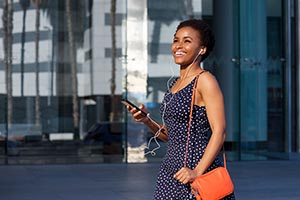
Certificates of deposit: How they work to grow your money

Managing money as a military spouse during deployment

When you set aside money for a rainy day, you probably picture using it for an unplanned expense like home repairs, replacing a flat tire or purchasing a new appliance. It’s okay, however, to give yourself permission to use part of your funds for something meaningful and even exciting.

Unplanned expenses could be things like an invitation to your sister’s wedding, a trip to a niece’s graduation or finding yourself in desperate need of a vacation. Each of these are viable reasons to considering spending hard-earned savings. To help you decide, consider the steps below.
Does this trip excite you? Will the memories motivate you in some way long after you’ve shared the pictures on social media? Is it a once-in-a-lifetime event you’d hate to miss?
We often feel obligated to travel for events, which can cause us stress or not allow us to relax during our time away. If the thought of this “vacation” makes you feel like you’d need another vacation afterwards, politely decline the trip and find a way to honor your loved ones from afar. Send a small but meaningful gift or note to show that you care but stay home and continue saving for an inspiring experience.
Alternatively, if the event will allow you to step away from your everyday routine and refresh, continue weighing your options.
Consider airfare, lodging, car rental, gas, food, the cost of events, shopping and any other expenses. If the destination is within driving distance, can you carpool and share the cost of gas? If you’d fly, can you carpool once you get there? Can your loved ones provide free lodging, or can you share a hotel room with someone?
After totaling your anticipated expenses, look at your savings. Do you have enough to cover it? If not, is there enough time to save additional funds? Regardless of how tempting the trip is, if you don’t have the means to pay cash for your expenses, charging the trip could harm your overall financial well-being and even set you behind on your goals.
Once you’ve determined that you can afford it, you may still need to create a detailed savings plan and budget. To help ensure success, it can help to share your goal with an accountability partner, with whom you can share your plan and request they hold you accountable and help you stay on track.
Once you have the money saved, book it, but look for ways to keep expenses in check. There are plenty of websites where you can find discounted hotel rooms, car rentals and airfare ̶̶ especially if you can be flexible with your dates.
If your destination is a prime vacation spot, consider staying outside of the main thoroughfare. Staying in a quaint nearby neighborhood allows you to take in more of the authentic local flavor as opposed to what most tourists experience.
Whatever the reason for your travel, you worked hard to save for it and deserve to enjoy it to the max. Make plans to do things with people you love. Hike, dine at local restaurants and make special memories you will treasure long after your trip.
After you return home, reach out to your accountability partner to celebrate your success and begin formulating your next goal and plan.
Visit us for more information on goals coaching and to schedule a meeting.
Related content


